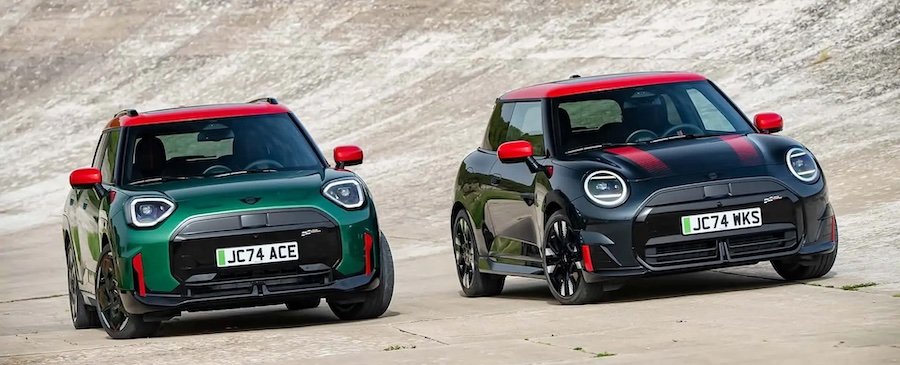New Mini John Cooper Works Drops the Manual Because Fun Is Overrated

It's only been a week since Mini introduced the first John Cooper Works models with fully electric drivetrains. If you'd rather stick to gas engines, the BMW-owned marque has got you covered. Say hello to the new three-door hot hatch and convertible in true JCW flavor. The two cars retain their turbocharged 2.0-liter gasoline engine but there are some ... changes.
Let's start with the good news. That "B48" engine of Bavarian origins now makes 280 pound-feet (380 Newton-meters) of torque. It's a significant increase of 44 lb-ft (60 Nm) over the preceding models. You don't get any extra horsepower, meaning the four-pot engine still sends 228 hp to the front axle.
And now for the bad news. The manual gearbox is dead. Mini offered the previous JCW hatchback with three pedals until the very end, while the cabrio lost the clutch pedal several years ago. In the new-generation models, the stick shift is gone forever. You’re stuck with a dual-clutch automatic transmission that allows you to change gears by using the paddle shifters mounted behind the steering wheel.
The three-door performance hatchback takes 6.1 seconds to reach 62 mph (100 km/h) from a standstill. If you want unlimited headroom, the convertible does the job in 6.4 seconds. The hardtop is not only quicker but also faster, reaching 155 mph (250 km/h) instead of the cabrio's 152 mph (245 km/h) top speed.
As you can imagine, the full-fat JCW models look a lot like the lesser JCW Trimmed models. You can tell them apart by the extra air inlets at the front where there are new vertical red strips. At the rear, the actual go-faster versions have a central exhaust tip and more of those vertical reflectors, although the red accents are only on the hatchback.
Another difference between the two body styles is in the taillight design. On the droptop, it's carried over from the previous-generation model. The lesser versions of the convertible also have the old taillight design. From the side, the legitimate JCW models have their own 17- and 18-inch wheel designs.
Mini is selling the hatchback with 11 body colors that can be combined with a red or black finish for the roof and side mirror caps. Go for the convertible, and you get an exclusive Copper Grey paint job and an either black or gray Union Jack pattern for the fabric roof. You can lower the roof in 18 seconds at speeds of up to 18 mph (30 km/h). Alternatively, the hardtop slides about 15.7 inches (40 centimeters) to serve as a sunroof.
The interior is also largely carried over from the Cooper 3-Door and Convertible in JCW Trim. Mini gives both cars a red and black theme, body-hugging front seats, and a chunky steering wheel. The 9.4-inch OLED circular display for the infotainment is standard, as is the Harman Kardon sound system. With its recent models, the Oxford-based marque has gotten rid of the driver’s display for the sake of minimalism.
The two-door hardtop JCW will start at $39,195, including a $995 destination charge. If you want the drop-top variant, that number rises to $44,695.
If Mini keeps its promise about going purely electric by the end of the decade, it effectively means these two cars are the last JCW models with a combustion engine. They're available alongside the more potent Countryman JCW, now with a mighty quad exhaust system.
Related News


